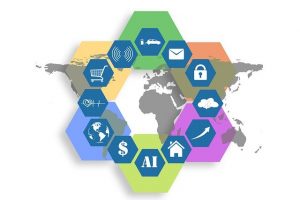
AI Marketing Google
For marketers and their organisations, Google has invested years in creating a variety of straightforward AI algorithms, templates, and tools.
We have disclosed a new technological partnership with Google Cloud that will guarantee that we are giving our clients the most effective AI marketing. The block will make it possible for our client brands to gain from more accurate real-time AI projections.
In light of this, we wanted to consider how far Google has come with AI. Let’s look at how they’ve helped businesses and marketers.
How is Google using AI for business?
Numerous commercial operations, including the hours when stores and restaurants are open, were modified by COVID-19. Google created a machine learning example that automatically analyses whether business hours are likely inaccurate to address these changes and enhance search engine user experience. When incorrect hours are identified, Google instantly updates the organisation’s business profile using AI-generated forecasts.
As an illustration, a company’s website might state that it is closed on Mondays but hasn’t been updated in over a year. Google will recognise that the hours are probably out of date and adjust them automatically if it discovers that Monday evenings are frequently the busiest time.
Additionally, it scans Street View images of storefronts for hours-of-operation signage, with estimates verified by neighbourhood guides and business owners. Calls to business owners are made using Google Duplex, an AI system that enables users to have realistic phone conversations and perform practical activities with computers.
Google expects that this technology will let them update the hours of more than 20 million businesses worldwide within the next six months.
How Google uses AI for search?
See how the world’s most widely used search engine uses the technology to understand AI in search better.
1. The Google Algorithm
The process through which Google returns search results is sometimes called the “algorithm” by individuals. “Algorithm modifications” that impact their search traffic have many firms worried. But there’s more to Google’s “algorithm” than that. A complicated system of AI-powered algorithms controls what and how search results are shown. Nobody on the outside comprehends how these algorithms work, but to perform efficient SEO, they frequently attempt to research different aspects of these algorithms.
Conversely, Google frequently recommends how this AI system should handle search results. And this much is certain:
The AI that powers Google search is honed to provide the best response for each inquiry. This entails offering the most relevant search result and the best possible result regarding content and on-site experience. There is no practical way to “beat the system” besides offering extraordinarily high-quality content suited explicitly for individuals.
2. RankBrain
A crucial component of artificial intelligence at the core of Google search is RankBrain. This technique aids Google Search in identifying the topics that are pertinent to your search.
Since Google can usually tell what you’re looking for, this improves search result accuracy and prevents your search words from being confused with concepts that sound similar but have entirely different meanings.
3. BERT
Google uses a form of artificial intelligence called BERT, which stands for Bidirectional Encoder Representations from the Transformers, to better understand the meaning and intent of searches.
BERT uses AI in sentiment analysis, natural language processing (NLP), and natural language understanding (NLU) to process each word in a search query about all the other terms in a sentence.
The way Google search used to work was not like this. In the past, Google’s AI parsed words in order. The results were accurate but literal. According to Google, a search like “2019 Brazil traveller to the USA requires a visa” in the past would have been interpreted as a US traveller requesting a visa to Brazil.
Prepositions that change the context of queries in that situation are not taken into account by Google. The word “to” fundamentally alters the search objective and would not have been considered. BERT is special. According to BERT’s analysis of the complete statement, the searcher is a Brazilian requesting a US visa.
This results in more precise searches that get to the core of what you’re trying to do with each search.
How AI helps in search SEO?
It’s straightforward. Consumers can use search engines to find what they’re looking for. Machine learning will be used to discover that exact thing when it happens. This is excellent news for advertisers since it ensures that the most pertinent content will win.
Selecting the right keywords and following the best SEO practices will still be essential. Still, as search engines get savvier, relevancy and content quality will be the main ranking factors.
AI-powered search engines get better at producing results as more data is gathered. This doesn’t mean you have to trick the algorithm, though. The components of the AI system that runs each search engine will never be known to anyone. It does, however, imply the following:
Search engines focus on a relatively straightforward objective. They desire that the user use their search engine as frequently and extensively as feasible. They must produce the best result possible to achieve this. If not, users will switch to another service.
Like companies and people, search engines have a reputation to uphold. They do not wish to accept bad outcomes. Keywords, content quality, page load speed, and user experience are all impacted. There is no rejecting the importance of using advanced SEO techniques.
Final words
Making life and work more accessible for everyone has always been the aim of Google’s creative team. AI, machine learning, and deep learning are incorporated into everything to enhance how humans complete tasks or find information.
We can work with the best data scientists in the world as we change predictive analytics for their and our customer’s thanks to our recent connection and ongoing partnership with Google on AI marketing innovation. We also think this partnership would guarantee that Google’s advancements in AI applications will directly benefit our clients.



